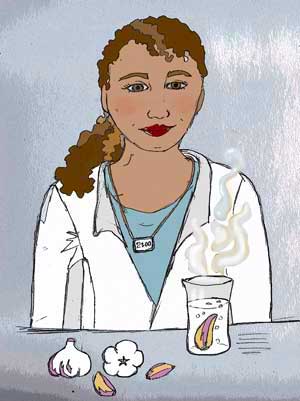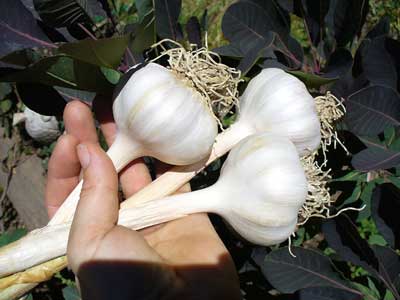Garlic Inhibits Tuberculosis Bacteria (possibly by jamming bacteria twitter feed)
 Hannan et al. (2009, 2011) reported that garlic inhibited growth of the tuberculosis (TB) bacteria. The researchers tested 20 different strains of TB; 15 isolates of Multi-Drug Resistant TB and five non-multi drug resistant TB cultures. Powdered and reconstituted in ethanol garlic was used at concentrations from 1.0-3.0 mg/ml. At this strength garlic inhibited all strains of TB bacteria. Garlic did not kill the TB bacteria or cure TB but it did inhibit it and halt its replication.
Hannan et al. (2009, 2011) reported that garlic inhibited growth of the tuberculosis (TB) bacteria. The researchers tested 20 different strains of TB; 15 isolates of Multi-Drug Resistant TB and five non-multi drug resistant TB cultures. Powdered and reconstituted in ethanol garlic was used at concentrations from 1.0-3.0 mg/ml. At this strength garlic inhibited all strains of TB bacteria. Garlic did not kill the TB bacteria or cure TB but it did inhibit it and halt its replication.
Garlic could be used as a supplement to the drugs currently used to cure tuberculosis. This may help to combat drug resistant TB.
Although the above research is new, this topic has been explored before. A search for garlic and TB revealed a paper from 1946 titled "Inhibition of Mycobacterium tuberculosis by Garlic Extract" by Rao et al. TB is caused by a mycobacteria. Previous research also indicates that garlic extract inhibited 30 different strains of mycobacteria (Delaha and Garagusi 1985).
Possible mechanisms: Garlic contains allicin, which has been found to inhibit bacterial replication. Allicin may work by inhibiting glutathione peroxidase. This enzyme decreases the production of reactive oxygen species (free radicals). Bacterial replication requires free radicals. Another garlic compound, ajoene, may inhibit TB's ability to make a protective cell wall.
 Picture: Gorgeous German Red garlic bulbs by purple leaves.
Picture: Gorgeous German Red garlic bulbs by purple leaves.
Second cool possible mechanism: Garlic may jam the bacteria's twitter feed. Some pathogenic bacteria, like Mycobacterium tuberculosis (Bharati and Chatterji 2013) and Pseudomonas aeruginosa, use quorum sensing (QS) to tweet all their followers. This communication system synchronizes the expression of specific genes involved in pathogenicity. When this happens relatively harmless bacteria turn 'bad'. Normally bacteria wait until a critical population number of followers is reached before they begin their biological warfare. They monitor other bacteria by keeping track of the number of QT 'tweets'. Crude garlic extracts as well as ajoene inhibits QS communication (Jakobsen et al. 2012). The garlic compound ajoene is like a cell phone jammer. It effectively isolates bacteria and prevents them from changing into their more virulent form.
The problem with TB: TB is an infectious lung disease caused by mycobacteria. Mycobacteria infections can be difficult to treat since they are resistant to many antibiotics. Their waxy cell wall protects them from environmental hazards and common antibiotics. About 1/3 of the world's population carries the latent form of TB. People with latent TB have a 1 in 10 chance of developing active TB.
The World Health Organization reported that TB killed 1.4 million people and infected 8.7 million people in 2011. Sadly, there were a reported 10 million orphaned children in 2010 due to parents death by TB.
Take home message: Garlic or garlic compounds may be used along with other medical treatments to combat tuberculosis (Dini et al. 2011).
References:
- Dini C, Fabbri A, Geraci A. The potential role of garlic (Allium sativum) against the multi-drug resistant tuberculosis pandemic: a review. Ann Ist Super Sanita. 2011;47:465-73. Pubmed. DOI: 10.4415/ANN_11_04_18
- Bharati BK and Chatterji D. Quorum sensing and pathogenesis: role of small signalling molecules in bacterial persistence. Current Science. 2013;105:643-656. Full paper.
- Delacha EC and Garagusi VF. Inhibition of Mycobacteria by Garlic Extract (Allium sativum). Antimicrobial Agents and Chemotherapy. 1985. 27: 485-486. Pubmed.
- Hannan A, Ikramullah M, Qayum A, Shah KA, Arshad U, Hussain S. Evaluation of anti-mycobacterial activity of garlic (Allium sativum) against clinical isolates of non-MDR and MDR Mycobacterium tuberculosis. Planta Med. 2009;75:1073.
- Hannan A, Ikram Ullah M, Usman M, Hussain S, Absar M, Javed K. Anti-mycobacterial activity of garlic (Allium sativum) against multi-drug resistant and non-multi-drug resistant mycobacterium tuberculosis. Pak J Pharm Sci. 2011;24:81-5. Pubmed.
- Jakobsen TH, van Gennip M, Phipps RK, Shanmugham MS, Christensen LD, Alhede M, Skindersoe ME, Rasmussen TB, Friedrich K, Uthe F, Jensen PØ, Moser C, Nielsen KF, Eberl L, Larsen TO, Tanner D, Høiby N, Bjarnsholt T, Givskov M. Ajoene, a sulfur-rich molecule from garlic, inhibits genes controlled by quorum sensing. Antimicrob Agents Chemother. 2012; 56: 2314–2325. Pubmed. doi: 10.1128/AAC.05919-11 (full paper).
- Rao RR, Rao SS, Natarajan S, Venkataraman PR. Inhibition of Mycobacterium tuberculosis by Garlic Extract. Nature. 1946;157:441-441. Pubmed.
